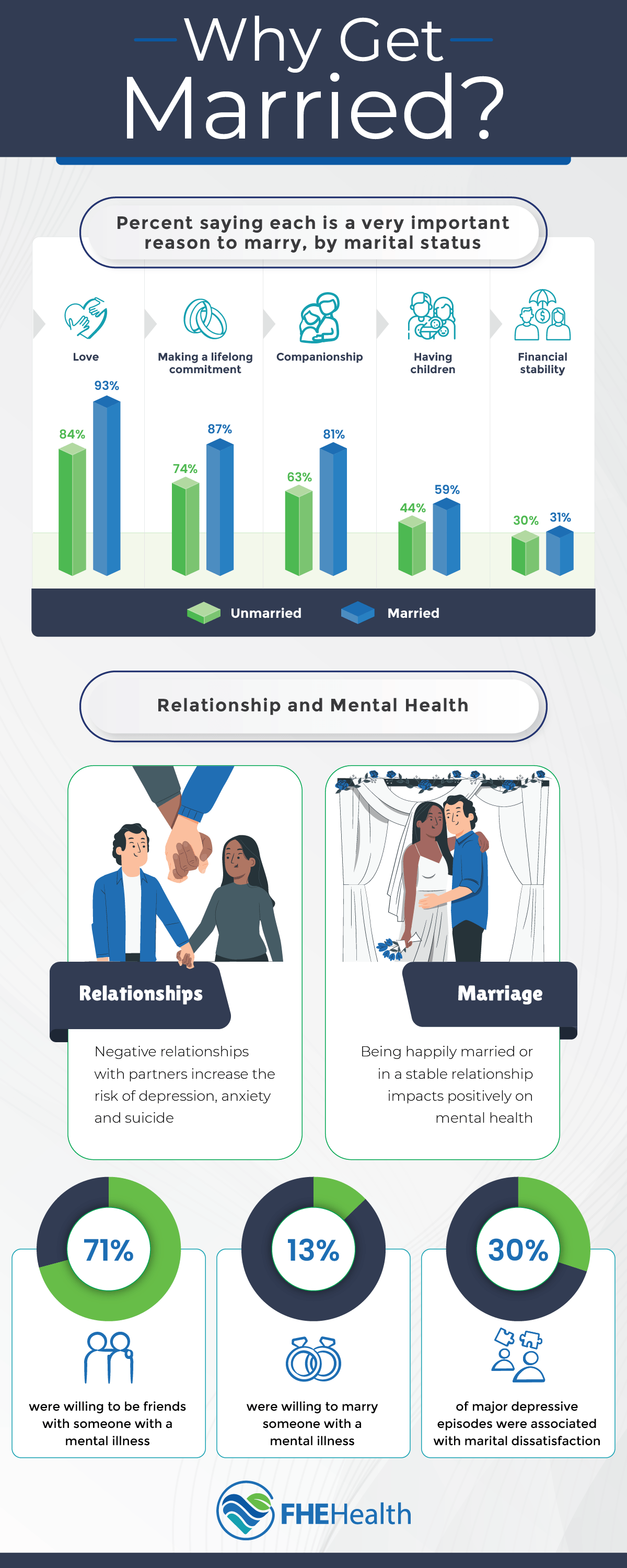
There’s a common belief that married people live longer and are generally happier than their single counterparts. While research suggests married people may have longer life spans, actual results vary, and some of the benefits may also apply to cohabitating couples. The connections between getting married, mental health and life span are complex, with many factors such as genetics and lifestyle choices to consider.
The Relationship Between Marriage and Mental Well-Being
While there’s a connection between mental well-being and marriage, the relationship can be a complex one.
People in healthy marriages enjoy being in a stable environment that helps them cope with stress and life challenges. Sharing life with a partner creates a sense of belonging and security, helping people feel understood and supported. Strong social support within a marriage can be a protective factor for mental well-being.
On the other hand, strained or unhappy marriages can lead to increased stress, anxiety and depression. The quality of the marital relationship plays an important role in both partners’ health and well-being.
Having a supportive spouse can provide a valuable outlet for expressing emotions and seeking comfort during challenging times. Additionally, sharing responsibilities inherent in a healthy marriage can contribute to a more manageable and less stressful daily life.
However, conflicts, lack of communication or feelings of isolation within a marriage may negatively impact a person’s mental health. High levels of marital stress contribute to increased psychological distress and low mood. Feeling isolated in an unhappy marriage can make any preexisting mental health conditions worse.

Getting Married? Mental Health Benefits
A happy, healthy marriage can have a positive impact on your mental health outcomes. While the exact advantages you can expect from getting married vary on an individual basis, here are some mental health benefits to consider:
- Emotional support. Marriage provides a built-in support system, offering emotional reassurance during challenging times. A supportive spouse can be a valuable confidante, reducing feelings of loneliness or isolation.
- Stability and security. Knowing you have a committed partner to share life’s ups and downs can alleviate stress and anxiety.
- Healthier lifestyles: Married couples can influence each other’s habits, including diet, exercise and substance use. The mutual encouragement to adopt healthier behaviors can positively impact mental well-being.
- Shared responsibilities. The division of responsibilities and tasks within a marriage can lead to a more balanced and manageable life. This can help you feel less overwhelmed in day-to-day living.
- Companionship. Having a constant companion in a spouse reduces feelings of loneliness.
- Increased life satisfaction. Having someone to share experiences, accomplishments and milestones contributes to feelings of fulfillment.
Do Married People Live Longer?
While some studies associate marriage with increased longevity, the relationship between marriage and life expectancy is more nuanced. Recent studies show that some of the longevity benefits typically attributed to marriage can apply to cohabitating couples as well.
Several factors contribute to the longevity of a married couple, such as the social support provided by a spouse. Marriage offers emotional and practical support, which can promote better health outcomes. Married couples are more likely to adopt healthier lifestyle habits together, such as regular exercise, balanced nutrition and avoiding smoking or excessive alcohol consumption. The mutual encouragement and accountability within a marriage reinforce these positive behaviors.
For some people, being single may provide opportunities for personal growth, self-discovery and fulfilling relationships outside of marriage. However, the absence of a supportive partner may increase feelings of loneliness and isolation, which are associated with poorer health outcomes and a shorter life span.
Marriage may offer certain advantages for health and longevity, but it’s far from a guarantee. It’s also not impossible for single people to lead long and fulfilling lives.
When Marriage Negatively Impacts Mental Health
Ongoing tension between two married people can increase stress levels and even cause anxiety or depression. The pressure to navigate shared responsibilities, financial matters or differing life goals can take an emotional toll and negatively influence well-being. Couples experiencing high levels of dissatisfaction and unhappiness in their marriage can feel isolated, frustrated and hopeless.
Spousal infidelity can have a profound impact on a person’s mental health post-marriage. The emotional trauma resulting from discovering a partner’s betrayal may cause low self-esteem and persistent anxiety. After a partner’s infidelity, the married couple may grapple with trust issues and struggle to rebuild their shattered relationship.
When one person suffers from substance abuse issues, it takes a toll on their spousal mental wellness. Living with a partner struggling with addiction issues may lead to heightened stress, anxiety and feeling helpless. The unpredictability and chaos associated with substance abuse can create an unstable and emotionally taxing environment.
Some people may expect a supportive and nurturing relationship and feel isolated when their spouse fails to meet those needs. A lack of communication or emotional intimacy can contribute to feelings of loneliness even when sitting next to your partner.
There’s no one-size-fits-all when it comes to marriage and mental health outcomes. Factors such as communication skills, conflict resolution strategies and the overall health of the relationship influence a person’s well-being within the marriage.
The Importance of Nurturing Your Mental Health
Prioritizing your mental health within the context of marriage is essential for your well-being and the health of the relationship. Open communication, active listening and emotional support form the bedrock of a healthy marital environment. Sharing concerns and daily challenges can contribute to feeling connected and understood by your spouse.
Self-care is just as important for the success of your marriage and your mental health. Practicing habits such as mindfulness, an exercise routine and seeking professional support when needed can help maintain your well-being. By prioritizing the mental health of both partners, couples can build a relationship that thrives in the middle of life’s challenges.
Do you think you might benefit from marriage counseling? If your marital issues or other mental health challenges are causing you distress, we can help. Our team of counselors is available for a confidential call about your needs at all hours of the day or night. Get in touch today and take the first steps toward a healthier, happier you.






